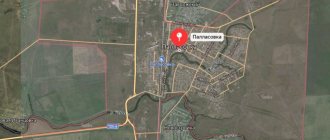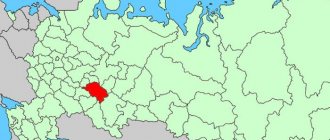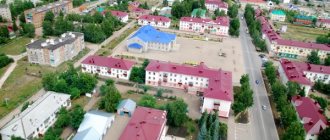Year founded: 1909
Nurlat
Nurlat
- a city in Russia, the administrative center of the Nurlatsky district of Tatarstan. The city is located on a tributary of the Volga, the Kondurcha River, 224 km from Kazan.
According to scientists from the Institute of History and Archeology, ancient settlements on the territory of the Nurlat region existed already in the Stone Age, during the Paleolithic. The largest of them are Novoalmetyevskoye and Novoamzinskoye, and in the third millennium BC Kiekle and Kizlyau arose.
Already in the 7th-9th centuries, the Bulgars built their cities and villages here. They founded the villages of Bilyar-Ozero, Krivoe Ozero, and Chulpanovo. A fertile climate, fertile chernozem soils, rich meadows and forests - life in the region was well-fed and calm. After the conquest of the Kazan Khanate by Ivan the Terrible in 1552, many defenders of Kazan found refuge in these parts.
Nurlat - radiant horse Back in the 19th century there was a village of Nurlaty, the name of which came from Nurly At - Nurly (Radiant), At (Horse).
The settlement of Nurlat as a station on the Simbirsk-Ufa railway line officially appeared on maps of Russia in 1911. But it was founded in 1905 as a station village in connection with the construction of the railway. Here, to the site of the future regional center, two families of railway workers arrived in 1909 and began to lay a local piece of the railway line. Construction of the station began with the construction of a booth near the semaphore.
In the “Memorial Book of the Samara Province” for 1910 it is written: “ Currently, a new rail track is being built, which will serve as a continuation of the Volga-Bugulma railway and connect the cities of Bugulma and Simbirsk. The new rail track, passing through rich commercial and industrial areas, where until now there was only horse transport, will significantly increase trade and economic well-being of the population
».
Modern youth center
In those days they worked only with the help of shovels and horses, but they built roads quickly; the new railway was ready within two years. On August 28, 1911, the first train passed here. Then houses appeared along the railway station, water pumps, and the first depot building.
The First World War and the years of the Civil War led the railway to a state of complete neglect. It took years to restore, but the efforts and dedication of people yielded results.
The updated Volga-Bugulma road was connected to the Samara-Zlatoust highway. In 1938, the station village became a workers' village, and in 1961 a city. By this time, the road had switched to electric and diesel traction. The first diesel locomotive passed through Nurlat in July 1962.
On December 10, 1997, by decision of the State Council of the Republic of Tatarstan, the city of Nurlat was classified as a city of republican subordination. So Nurlat has come a long way from a trackman’s booth to a modern city.
The population of the city is more than 32 thousand people (2020).
Day of the city
in Nurlat it is celebrated in the fall.
Contacts and office hours of the Nurlatsky District Court of the Republic of Tatarstan
Telephone (phone/fax), +7 (843) 453-16-02
Court opening hours
- Monday - Thursday from 8:00 to 17:00
- Friday from 8:00 to 15:45
- Lunch from 12:00 to 12:45
- Saturday, Sunday – closed
E-mail address
Business hours
Court reception Reception of applications, complaints, statements of claim from citizens, their representatives, as well as representatives of legal entities is carried out on a first-come, first-served basis. We do not accept appointments by appointment. Office No. 104
- Monday - Thursday from 8:00 to 17:00
- Friday from 8:00 to 15:45
- Lunch from 12:00 to 12:45
Chairman of the Court, Office No. 208
- Thursday from 8:00 to 10:00
- Friday from 14:00 to 15:45
Contacts
- Court fax (general)
- Court reception
- Reception of the chairman of the court
- General office
- Court administrator
The procedure for familiarizing with the case materials of persons participating in the case
The procedure for issuing court cases and documents in the Nurlatsky District Court of the Republic of Tatarstan (approved by Order of the Chairman of the Nurlatsky District Court of the Republic of Tatarstan dated October 31, 2016 No. 44-K) (extract)
- Court cases (other materials) are issued for review at the court premises on the basis of a written application upon presentation of the following documents:
a) accused, defendants, convicted, acquitted, persons against whom proceedings are being conducted for an administrative offense, victims, parties to the case, third parties, legal representatives in criminal, civil cases and cases of administrative offenses, applicants and other interested parties in cases of special proceedings and in cases arising from public legal relations, civil plaintiffs, defendants in criminal cases - an identification document, and their representatives, defenders - also a power of attorney, drawn up in accordance with the requirements of the law.b) lawyers acting in criminal, civil cases and cases of administrative offenses - warrants of the appropriate legal education and identification cards and (or) lawyer certificates;
c) other interested parties acting in criminal, civil cases, cases of administrative offenses - identification documents and powers;
d) prosecutors - official identification;
e) other officials in the presence of a legal basis - a reasoned written request;
f) rehabilitated persons, and with their consent or in the event of their death - heirs, close relatives, relatives, dependents - an identification document and (or) authority, as well as confirming the corresponding relationship (the fact of being a dependent).
- Familiarization of the persons specified in paragraph 1 of this Procedure with the materials of the court case (other materials) is carried out on the basis of their written application with the corresponding resolution of the judge in whose proceedings the court case is (or was), and in his absence - the chairman of the court (or his deputy). This application is filed in the file, and if a power of attorney is presented, a copy of it is also attached to the file.
Familiarization with cases (other materials) is carried out during working hours - Monday - Thursday from 08:00 to 17:00, Friday from 8:00 to 15:45, with a lunch break from 12:00 to 12:45, in the court office in the presence of an authorized employee of the court apparatus in conditions that exclude the seizure, damage, destruction of case materials, as well as the introduction of corrections and additions to them, or their transfer to another person.A note about familiarization with the case is made on the information sheet.
The following persons are appointed responsible for familiarization with cases:
- for cases pending before a judge, an assistant judge or a court secretary, depending on the workload;
on cases considered and located in the records management department by the court secretary, leading specialist or chief specialist;
- for cases in the court archives - the employee responsible for archival records management.
After familiarizing yourself with the court case (other materials), a court employee, in the presence of the person who has become familiar with the court case (other materials), checks the status of the case and the presence of all documents in the case, makes a note in the application that the case has been returned. If, after the return of the case, an authorized employee of the court staff reveals that the case materials have been seized, damaged, as well as corrections and additions have been made to them, the chairman of the court or his deputy is immediately informed about this.
At the written request of the bodies to which the law has granted the right to claim the case, and on the basis of the order of the chairman of the court or his deputy, court cases are sent to them within three days by registered mail or by messenger.
A court staff member is required to monitor the return of cases and report to the chairman of the court at least once a month.
Until the case is returned to the court by a request for expulsion, copies of the covering letter, judgment or decision are kept in a control folder.
The registration and statistical card indicates when, to whom and on what request the case was sent, and when it was returned to the court.
Source: official website of the Nurlatsky District Court of the Republic of Tatarstan https://nurlatsky.tat.sudrf.ru
Information Technology
List of subsystems of the State Automated System of the Russian Federation “Justice” used in the Nurlatsky District Court of the Republic of Tatarstan:
- subsystem “Organizational support”;
- subsystem "Law";
- subsystem “Judicial records management and statistics”;
- subsystem “Bank of court decisions (judicial practice)”;
- subsystem "Personnel";
- “Video-conferencing” subsystem;
- subsystem “Display of information for collective use”;
- subsystem “Internet - portal of State Automated System “Justice””;
- subsystem “Document flow and citizens' appeals”;
- subsystem “Ensuring operation and maintenance”;
- subsystem “Communication and data transfer”;
- subsystem “Ensuring information security”;
- Information and reference subsystem;
- subsystem "Forensic examination".
List of information and reference systems used in the Nurlatsky District Court of the Republic of Tatarstan:
- Information and reference subsystem of the State Automated System "Justice";
- Information and reference system "Consultant-Plus".
List of technical means available in the Nurlatsky District Court of the Republic of Tatarstan:
- 3 sets of server equipment;
- 1 set of firewall equipment;
- 1 data storage module;
- 28 sets of workstations;
- 4 stationary sets of audio recording and technical recording of court hearings (SRS Femida);
- 1 mobile set of audio recording and technical recording of court hearings (SRS Femida);
- 1 set of equipment “Room of a hidden witness” and 2 sets of equipment “Courtroom” for a hardware and software complex for providing witness protection;
- 1 set of video conferencing equipment;
- network hardware;
- information kiosk
- set of IP telephony equipment.
Channels of connection:
- departmental communication channel GAS “Justice”;
- Internet access.
The procedure for submitting and receiving applications and complaints in court
A plaintiff is a person who goes to court to protect his violated or disputed right. The defendant is the person against whom the claim is brought, that is, the person who, in the opinion of the plaintiff, violates or challenges his rights and interests protected by law. Naturally, each of the parties has opposing interests in the lawsuit: the plaintiff insists on satisfying his demands, and the defendant objects to them. The plaintiff and defendant are “ interested parties ” (this is a legal term) because they have a personal interest in resolving the dispute. They act in the process on their own behalf, bear the legal costs of the case, and are subject to the legal force of the court decision.
In addition to the plaintiff and defendant, persons who have independent claims on the subject of the dispute may take part in the process, as well as in the event that the decision in the case may affect their rights or obligations in relation to one of the parties. Such participants in the process are called third parties. Both individuals (citizens, foreigners, stateless persons) and legal entities can act as parties and third parties in civil proceedings, that is, organizations that have separate property, can acquire property and personal non-property rights in their own name, bear duties, to act in court as a plaintiff and defendant. To participate in the process, citizens and organizations must have civil procedural capacity, that is, the ability to have civil procedural rights and obligations. Civil procedural legal capacity is recognized by law equally for all individuals, as well as for organizations enjoying the rights of a legal entity, and arises for individuals from the moment of birth, and for legal entities - from the moment of their creation.
Minors under the age of 14 , as well as individuals recognized as incompetent due to mental illness or dementia, do not participate in civil proceedings, and their rights and interests protected by law are protected in court by their legal representatives - parents, adoptive parents or guardians. A minor aged 16 to 18 years can personally exercise his procedural rights and perform procedural duties in court from the time of marriage or declaration of full legal capacity (emancipation). Minors aged 14 to 18 years , as well as individuals recognized as having limited legal capacity due to alcohol or drug abuse, participate in the process together with their legal representatives - parents, adoptive parents, trustees. In cases provided for by law, in cases arising from labor, collective farm and marriage-family legal relations, and from transactions related to the disposal of earnings received, minors have the right to personally defend in court their rights and interests protected by law. The involvement of legal representatives of minors in such cases depends on the discretion of the court.
To protect their rights and interests, parties to civil proceedings are endowed with significant procedural rights. They can get acquainted with the case materials, make extracts from them, make copies, challenge the judges, prosecutor, expert, translator, court secretary, members of the public, present evidence, participate in the study of evidence, ask questions to other persons participating in the case, witnesses and experts, give oral and written explanations to the court, file motions and present their arguments and considerations on all issues arising during the trial, as well as object to motions, arguments and considerations of other persons participating in the case, appeal decisions and rulings of the court, and so on Further.
The court does not initiate civil cases on its own initiative. Civil cases are initiated either at the request of the person himself, seeking protection of his right or interest protected by law; or at the request of the prosecutor; or at the request of government bodies, trade unions, enterprises, institutions, organizations, and so on.
In cases of claim proceedings, statements of claim are filed, and in cases arising from public relations and in cases of special proceedings - complaints and statements.
A judge can consider cases either individually or collectively. Justices of the peace hear cases only individually.
The magistrate considers as a court of first instance:
- cases of issuing a court order;
- cases of divorce, if there is no dispute between the spouses about children;
- cases of division of jointly acquired property between spouses with a claim price not exceeding fifty thousand rubles;
- other cases arising from family law relations, with the exception of cases of challenging paternity (maternity), establishing paternity, deprivation of parental rights, limiting parental rights, adoption of a child, other cases of disputes about children and cases of recognition the marriage is invalid;
- cases on property disputes, with the exception of cases on inheritance of property and cases arising from relations on the creation and use of results of intellectual activity, with the cost of the claim not exceeding fifty thousand rubles;
- cases to determine the procedure for using property.
The statement of claim is submitted to the court in writing. The law stipulates what information must be contained in the statement of claim and prescribes its mandatory form.
The application must indicate:
- Name of the court to which the application is filed;
- The name of the plaintiff, his place of residence or, if the plaintiff is an organization, its location, as well as the name of the representative and his address, if the application is submitted by a representative;
- The name of the defendant, his place of residence or, if the defendant is an organization, its location;
- What is the violation or threat of violation of the rights, freedoms or legitimate interests of the plaintiff and his demands;
- The circumstances on which the plaintiff bases his claims and evidence supporting these circumstances;
- The price of the claim, if it is subject to assessment, as well as the calculation of the amounts collected or disputed;
- Information on compliance with the pre-trial procedure for contacting the defendant, if this is established by federal law or provided for by the agreement of the parties;
- List of documents attached to the application.
The application may indicate telephone numbers, fax numbers, email addresses of the plaintiff, his representative, the defendant, other information relevant to the consideration and resolution of the case, as well as the plaintiff’s requests. Indicating the addresses of the parties and other persons involved in the case is essential for determining the jurisdiction of the case (see below for this), as well as for sending subpoenas and notices. In cases where the law provides for the possibility of declaring a search for the defendant (Articles 119, 120 of the Code of Civil Procedure of the Russian Federation), the plaintiff is not obliged to give the exact address of the defendant, but may limit himself to indicating his last known place of residence. The application is signed by the plaintiff or his representative. A statement of claim filed by a representative must be accompanied by a power of attorney or other document certifying the authority of the representative. After submitting a statement of claim, complaint or application to the court in a special proceeding, the judge is obliged to formalize his decision to initiate legal proceedings in the form of a ruling and order pre-trial preparation.
All determinations at this stage are made in writing.
If the judge refuses to accept the application or returns or leaves the application without movement, then this decision is formalized in the form of a ruling, a copy of which is given to the applicant.
Definitions must contain the following information:
- Time and place of delivery;
- The name of the court that issued the ruling, the names of the composition of the court and the secretary of the court session;
- List of persons participating in the case and the subject of the dispute;
- The issue on which the determination is made;
- The reasons on which the court came to its conclusions and reference to the laws that guided the court;
- Court statement;
- The procedure and deadline for appealing (this point is indicated in those determinations that can be appealed).
If the court's ruling does not contain any of the listed elements, then it is considered to be made in gross violation of procedural law. After the application has reached the judge (it can be delivered in person or sent by mail - this is permitted by law), the judge, in accordance with Articles 133, 134 of the Code of Civil Procedure of the Russian Federation, decides whether to accept it or refuse to accept it.
Article 134 of the Code of Civil Procedure of the Russian Federation establishes an exhaustive list of grounds for refusing to accept an application, that is, the judge does not have the right to refuse on any other grounds. If the judge’s ruling refuses to accept the application and the applicant does not agree with this, he has the right to appeal this ruling to a higher court by filing a private complaint (see sample below). A private complaint is filed through the office of the court whose ruling refused to accept the application, and the office itself then forwards the complaint and materials to a higher court for consideration. A private complaint must be filed (or mailed) within ten days from the date of the decision to refuse to accept the application. If this deadline is missed for a good reason (illness, business trip, etc.), then in a private complaint you must ask for the restoration of the missed deadline for filing a private complaint, attaching a supporting document to it. A private complaint is not subject to state duty.
Citizens may conduct their cases in court in person or through representatives. The right to conduct a case in judicial authorities through a representative belongs to the persons participating in the case: parties, third parties, both with and without independent claims. Judicial representation is possible in any civil cases and at all stages of the civil process: in the court of first instance, when reviewing court decisions in cassation and supervisory procedures, in newly discovered circumstances, in enforcement proceedings. Conducting a case with the help of a representative does not deprive a party of the right to personally participate in the process together with his representative.
If it is necessary for the court to receive personal explanations, the court has the right to summon a party even if there is a representative (in claims for divorce; in cases of establishing paternity, etc.).
Article 49 of the Code of Civil Procedure of the Russian Federation establishes that legally capable persons who have duly formalized authority to conduct the case may be representatives in legal proceedings (with the consent of the person being represented). Judges, investigators, and prosecutors cannot be representatives in court, except when they participate in the process as representatives of relevant bodies or legal representatives. Most often, lawyers act as representatives in court (we will dwell further on the features and principles of the participation of a lawyer in civil proceedings).
There are two types of representation - by force of law and by proxy.
The rights and legally protected interests of incapacitated citizens, citizens who do not have full legal capacity, and citizens recognized as having limited legal capacity are protected in court by their parents, adoptive parents, guardians or trustees, who present to the court documents certifying their powers. Legal representatives perform on behalf of the represented all procedural actions, the right to perform which belongs to the represented, with the restrictions provided for by law (Part 1 of Article 52 of the Code of Civil Procedure of the Russian Federation).
Legal representatives do not require a special document such as a power of attorney; only a document certifying their status is sufficient, for example a child’s birth certificate. In a case in which a citizen recognized as missing in the prescribed manner must participate, a guardian appointed to protect the property of the missing person acts as his representative.
In a case in which the heir of a person who has died or was declared dead in the prescribed manner must participate, if the inheritance has not yet been accepted by anyone, a guardian appointed to protect and manage the inherited property acts as a representative of the heir. The law gives legal representatives the right to entrust the conduct of a case in court to another person chosen by them as a representative, as expressly stated in Part 3 of Article 52 of the Code of Civil Procedure of the Russian Federation. The second type of representation is by proxy. In this case, the powers of the attorney (that is, the one who was authorized) are formalized by a special document - a power of attorney, certified by a notary or the relevant official.
The powers of the representative (attorney) can also be expressed in an oral statement of the principal (that is, the one who authorizes) in court, recorded in the minutes of the court session. A power of attorney can be issued to conduct a specific business, several or all affairs of the principal, or to perform individual procedural actions. The validity period of a power of attorney cannot exceed three years, and if the period is not specified in the power of attorney, it remains valid for one year from the date of its issue. A lawyer's authority to conduct a case in court is certified by a warrant issued by a legal entity, such as the director of a law office (senior partner). Having accepted the assignment to conduct the case, the judicial representative becomes an independent participant in the civil process and is endowed with procedural rights. Thus, the representative has the right to get acquainted with the case materials, make extracts from them, file challenges, participate in the court hearing, present evidence and participate in its examination, file motions, speak in debates, and the like.
At a court hearing, the representative acts within the powers granted to him by the principal. If a judicial representative goes beyond the limits of the rights granted to him, his actions do not entail legal consequences for the principal, and court decisions (decisions, rulings) based on them are subject to cancellation by higher courts. For this reason, the activities of the representative are carried out under the control of the court, which is obliged to check the scope of his powers, whether his actions contradict the interests of the principal and the law, whether there are circumstances that exclude the possibility of his participation in court, and the like.
Powers of attorney issued by citizens can be certified both by a notary and by enterprises, institutions or organizations where the principal works or studies, a housing maintenance organization at the principal’s place of residence, the administration of a hospital hospital, or a military unit, if the power of attorney is issued to military personnel. A power of attorney issued by a citizen who is imprisoned is certified by the administration of the corresponding place of imprisonment. A power of attorney on behalf of a legal entity is issued by its head.











